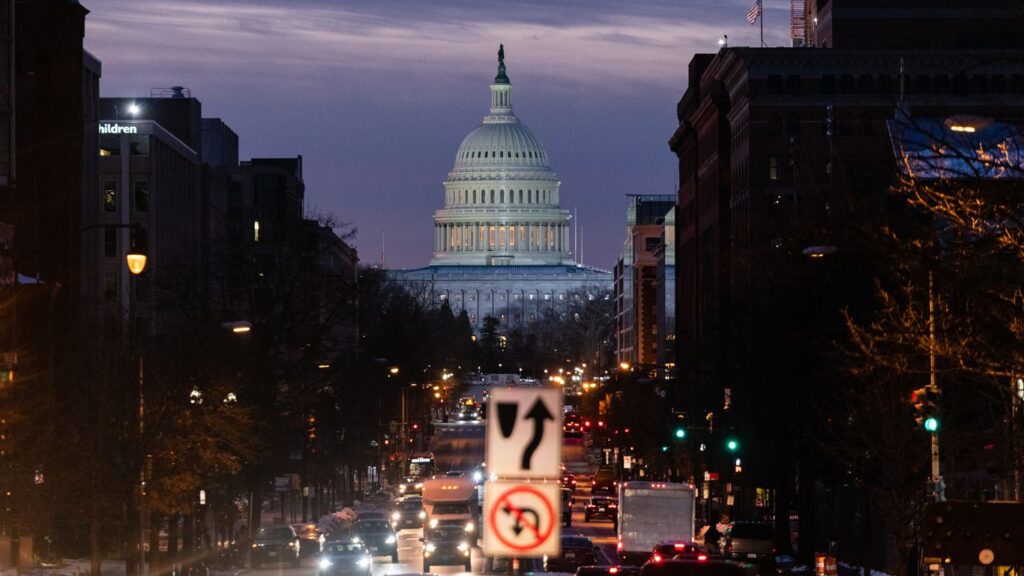
Audience
- Sentiment: Critical
- Political Group: Democrats
- Age Group: 18-35
- Gender: Both
Overview
- Democratic lawmakers are expressing concerns about proposed funding cuts to agencies like USAID, fearing it undermines democratic values.
- The article discusses internal struggles within the Democratic party regarding strategies for funding negotiations.
- There is a looming government deadline that adds urgency to the negotiations between Democrats and Republicans.
Title: The Inside Story of Government Funding and the Fight Against Big Changes
The world of politics can sometimes seem like a giant game with lots of moving pieces, and right now, there’s a significant battle brewing in Washington, D.C. This battle doesn’t involve swords or shields but rather budgets and long-term plans. Recently, Democratic lawmakers have been making headlines as they grapple with some serious issues tied to government funding, especially in light of actions by President Donald Trump and Elon Musk. So, what’s happening, and why is it important? Let’s break it down.
Understanding the Players
First, let’s talk about the key players involved in this story. On one side, we have the Democrats, which is a political party that generally supports government programs to help people, like healthcare, education, and international aid. On the other side are Republicans, another political party that often favors less government involvement and lower taxes. Then we have two prominent individuals: Donald Trump, the former president, and Elon Musk, the billionaire entrepreneur known for companies like Tesla and SpaceX. Both men have a significant influence on political discussions today.
During Trump’s presidency, he pushed for major changes to how the government operated. This reshaping involved downsizing various government agencies, including the U.S. Agency for International Development (USAID), which focuses on humanitarian aid and international development. That might sound boring at first, but it affects millions of people worldwide who depend on U.S. assistance for better living conditions, health, and education.
What’s Happening Now?
Now, let’s get to the juicy part. Recently, Democratic lawmakers—including Senators Andy Kim and Chris Murphy—have expressed deep concerns about proposals that would potentially cut funding to important agencies like USAID. They believe these cuts are not just financially harmful; they also go against democratic values and weaken the U.S. government’s role in helping others around the world.
The issue is serious enough that these Democratic leaders are threatening to withhold their support for any government funding deals that may enable these cuts. They’re essentially saying, “If you try to decrease funding and dismantle these crucial government units, we won’t back your proposals.” This statement is a significant power move in politics because government funding needs bipartisan support—that is, both parties need to agree for anything to pass.
The Pressure’s On
Now, why is there so much urgency? The government has deadlines, and one of the next big ones approaches on March 14. Republicans are under pressure to come up with a compromise that satisfies both their party members and the Democrats. However, there is a struggle within the Republican Party itself as they try to unite their members around a common funding plan. Some Republicans might be in favor of cutting agency funding to appeal to their political base, while others worry about the long-term consequences these cuts might have on America’s global presence.
In this high-stakes environment, the Democrats see an opportunity. They are pushing for investigations into what they consider misconduct related to these funding proposals. They want transparency and accountability, urging government employees to step forward if they notice anything suspicious. The call for investigations indicates that they are unwilling to sit quietly while they believe that significant budget changes are being made that could harm not only U.S. interests but also its reputation abroad.
An Internal Struggle
However, it’s not all smooth sailing for the Democrats either. Within the party, there are different opinions on how to approach the funding negotiations. Some members advocate for an aggressive stance against funding cuts, while others worry about the political fallout if they push too hard and the government runs out of money. This debate shows that even within a single party, strategies can vary significantly based on different priorities and viewpoints.
What Does This Mean?
For everyday Americans, this fight over government funding might feel distant, but it has important implications for our society. If the cuts go through, programs that assist the needy, promote education, and provide health care in the U.S. and abroad may suffer. The ramifications could not only lead to loss of services but could also strain relations between the United States and other countries that rely on aid. Imagine a kid your age living in another country who depends on U.S. aid for their education. A reduction in funds could potentially limit their access to necessary resources, affecting generations to come.
Moving Forward
As the deadline approaches, all eyes will be on the negotiations between Democrats and Republicans. Will they be able to unite for the common good, or will partisan issues keep them from reaching an agreement? The stakes are high, and the mood in Washington is tense. This conflict is not only about money; it’s about values, beliefs, and what the U.S. stands for on the world stage.
So, why does this matter to you? Well, it’s vital to understand how these decisions can affect not just the next U.S. election but also global relationships and humanitarian efforts. As future leaders, your opinions on these matters could shape what happens next.
With all this in mind, I pose a question to you: How do you feel about the government cutting funds to agencies like USAID? Do you think it’s important for the U.S. to continue its international aid programs, or should the focus remain on domestic issues? Share your thoughts in the comments below—I’d love to hear what you think!





